So something I do far too often is to keep a million tabs open, and maybe 6ish months later I bookmark every tab in one big folder and tuck it away never to be looked at again. Most of the time it's because there's something really interesting I want to read more about but I never actually do. This year I'm going to combat it up by writing up mini blogposts about the interesting stuff I've found, and finally delete all those fucking tabs.
This will undoubtedly take multiple posts. Here's the first one!
Architecture
We're starting off strong with some bookmarks for different kinds of architecture I was researching back in... oh god... 2021/2022 I think. This was research for Chapter 9 of Inhibit, when the kids were going to Larner. I wanted the Larner campus to look very organic in comparison to Urquhart's huge looming building and I found a bunch of neat terms!
| Blobitecture: "a movement in architecture in which buildings have an organic, amoeba-shaped building form" [X]. | 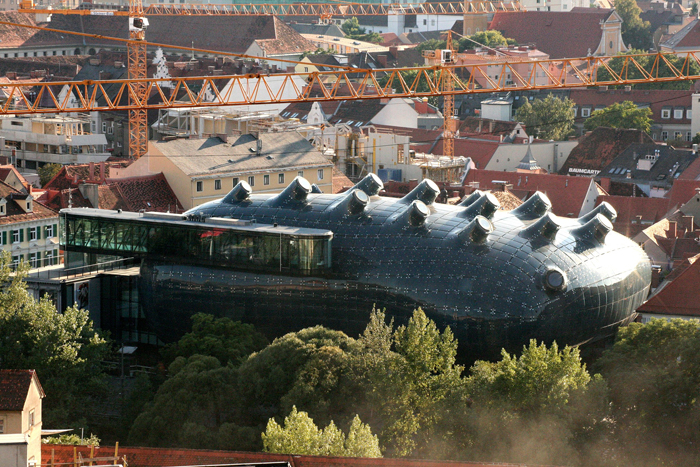 Peter Cook and Colin Fournier's Kunsthaus in Graz, Austria |
| Parametricism: designs that rely on "programs, algorithms, and computers to manipulate equations for design purposes [X]. | 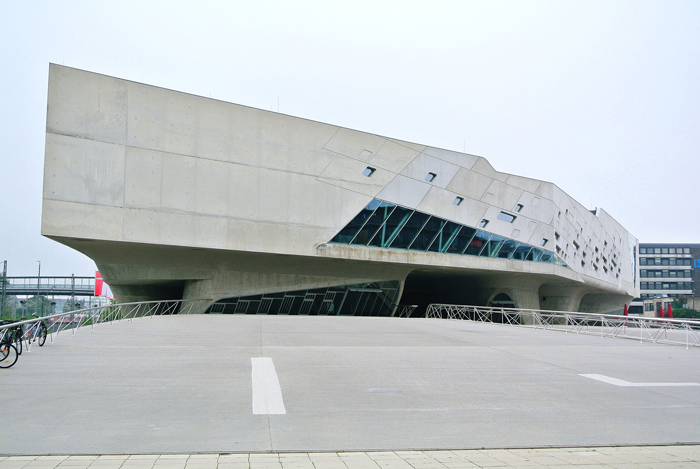 PHAENO science center |
| Neo-futurism: "a futuristic rethinking of the thought behind aesthetics and functionality of design in growing cities" [X]. |  Museum of Tomorrow in Rio de Janeiro by Santiago Calatrava, 2015 |
| Deconstructivism: a movement that "gives the impression of the fragmentation of the constructed building, commonly characterised by an absence of obvious harmony, continuity, or symmetry" [X]. | 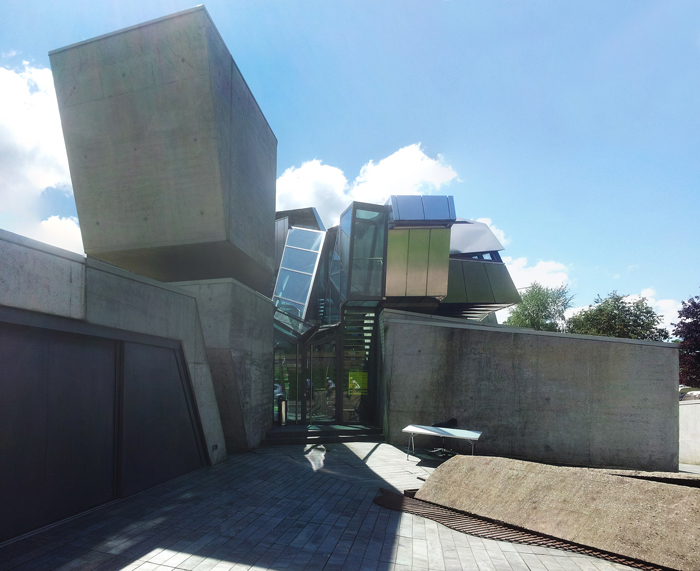 Gunter Domenig's "Steinhaus" at Lake Ossiach, Austria |
I really like the look of these kinds of buildings, like they're living but silent creatures, bubbling up into existence straight from the ground. I would love to be the kind of person who can just draw interesting looking buildings but I'm unfortunately not interested in developing that skill.
Food
In 2012 I visited my friend in Finland and became obsessed with Karelian pies. They're these little rye and porridge pastry things that we'd pick up from the supermarket every time we went food shopping and they were so, so tasty. I dreamed about them for years. In 2022 I finally looked up a recipe and made some! And they were great!! The recipe I followed is right here. Here were mine:
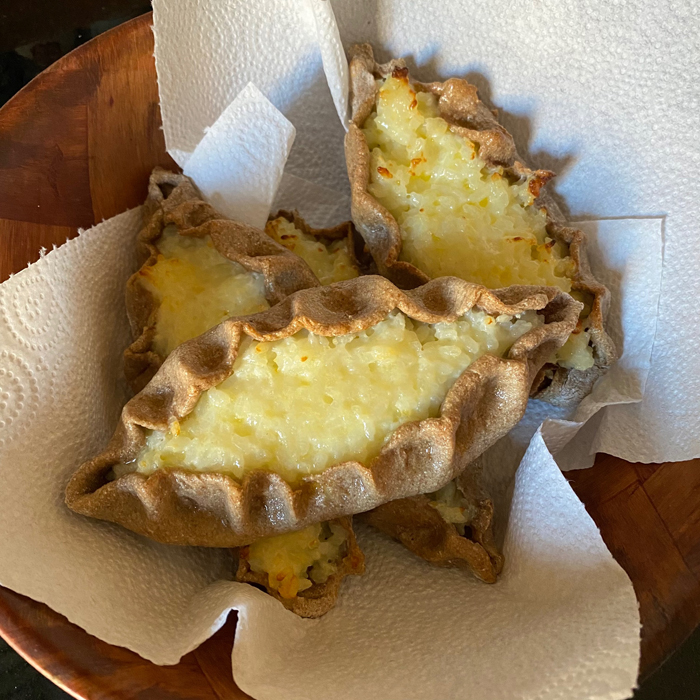
Looking at this picture again now, I'm tempted to make more. Three years later.
Here's another recipe I've been clinging to for a while: Mom's Hearty Beef Stew. It's super easy and customisable (I LOVE calling recipes "customisable"), and is very filling. The first time I made this was also my first time making dumplings and I was surprised how much they added to the texture and experience of eating a big fuck-off bowl of stew. This is the kind of dish that photographs really ugly so I'm not going to bother showing any photos but it's real tasty. Glad I found this buried in my bookmarks so I can make it again soon.
Japanese
Like I mentioned in my last blogpost, I've been getting back into learning Japanese over the last year and it's been a lot of fun. I like to get a lot of information about a lot of subjects very quickly when I'm studying a language so I did lots of research into how Japanese handles different things, one of the most important being gender neutral terminology and LGBTQ+ terms.
I found these two articles from Tofugu, both released in 2020, which gives a nice overview of the kinds of terms available to queer Japanese speakers and also the attitudes towards queerness in Japan:
- Beyond the Binary: A Queer Take on Gendered Japanese How to navigate gendered language no matter your identity.
- Coming Out in Japan From pots and pans to alphabet soup: Japanese queer identities in context.
The first article goes fairly indepth on how gender is expressed in the Japanese language; Japanese has multiple pronouns that people can choose to use, and their pronoun choice alongside other small choices like conjugations or particles (like adding ne onto the end of a sentence) can be used to perform gender. It's really interesting and completely different to how English handles pronouns and gendered language so I highly recommend giving it a read. Here's a chart from the article explaining the spectrum of the first person pronoun "I":

From left to right and from masculine to most feminine we have ore, boku, jibun ("oneself"), watashi, and atashi. Speakers don't have to just stick to one, though; speakers may grow out of using boku or atashi, or using watashi normally but ore when angry. I won't rehash everything the article said, just go read it.
The second article is more focused on terminology itself. As the article explains, there was a relative historical tolerance of gender non-conforming people in Japan, but that does not mean it's a queer-friendly country for native Japanese speakers. Foreigners are given more of a pass because they aren't expected to fit into the strict societal rules.
Many of the modern Japanese queer terms are taken straight from English (Japanese looooves a loanword), so you get words like gei "gay", rezubian "lesbian", etc. But there are some interesting historical words that are still circulating, both as accepted terms and slurs. I'll let you read the article to see what they are, they're kind of fun.
Scripts
I've saved a bunch of interesting scripts I wanted to look at again! I'm compiling them all here so I can easily find them next time I want to look at them. I love to look.
Sigil Panel Script by Ian James, created for SIGIL. It has a page on Omniglot. I haven't yet looked into SIGIL properly but I'm intrigued by this syllabic, phoneme-based script.
Below is the text "All human beings are born free and equal in dignity and rights":
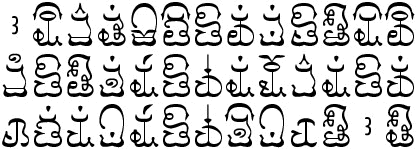
The panel script has a linear version too, which has an Omniglot page of its own. The same text below:

That's all for today. It's good to finally clear these bookmarks out; most of the stuff I was able to just delete without sharing, or links had died, or it wasn't relevant anymore. There's a lot of neat stuff out there; doing this kind of gives me the same feeling as StumbleUpon, which I used loaaads in uni. An article the BBC put out in December last year highlights that the reason StumbleUpon isn't a thing anymore is because the internet as it existed back then just doesn't exist anymore: "The idea of a platform built around sending users off to websites owned by another company is practically unimaginable today. The current economic structure of online advertising incentivises companies to keep you on their pages, or in their apps, for as long as possible."
I want to return to websites. I want to return to little spaces people have created for themselves to share information and their interests. I'm really glad I found that link to Ian James' website; it's the exact kind of odd little rabbithole I want to spend an afternoon exploring.
I hope you find some weird and interesting shit, and that I also find some weird and interesting shit next time I dive into my rotting bookmarks.